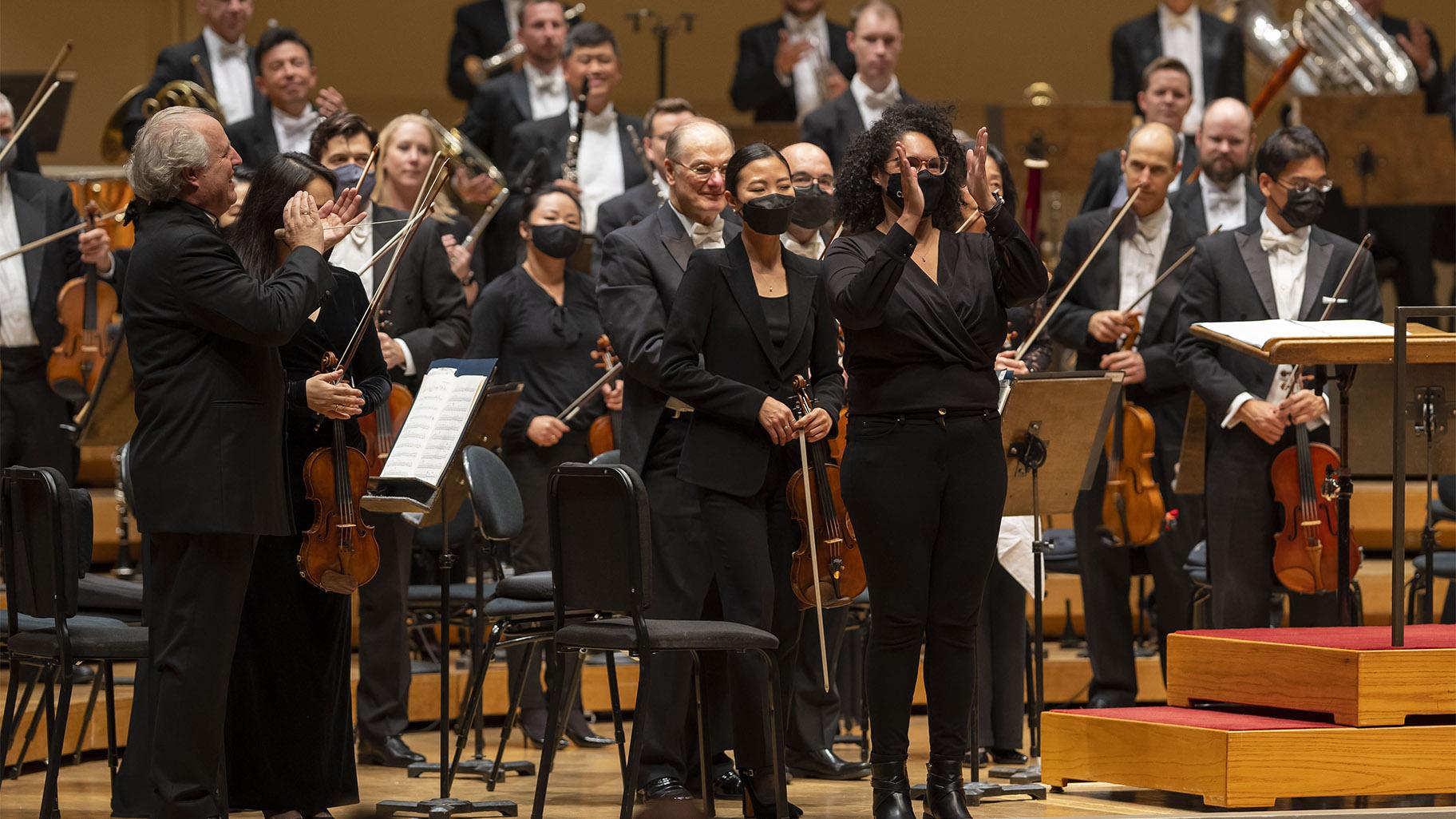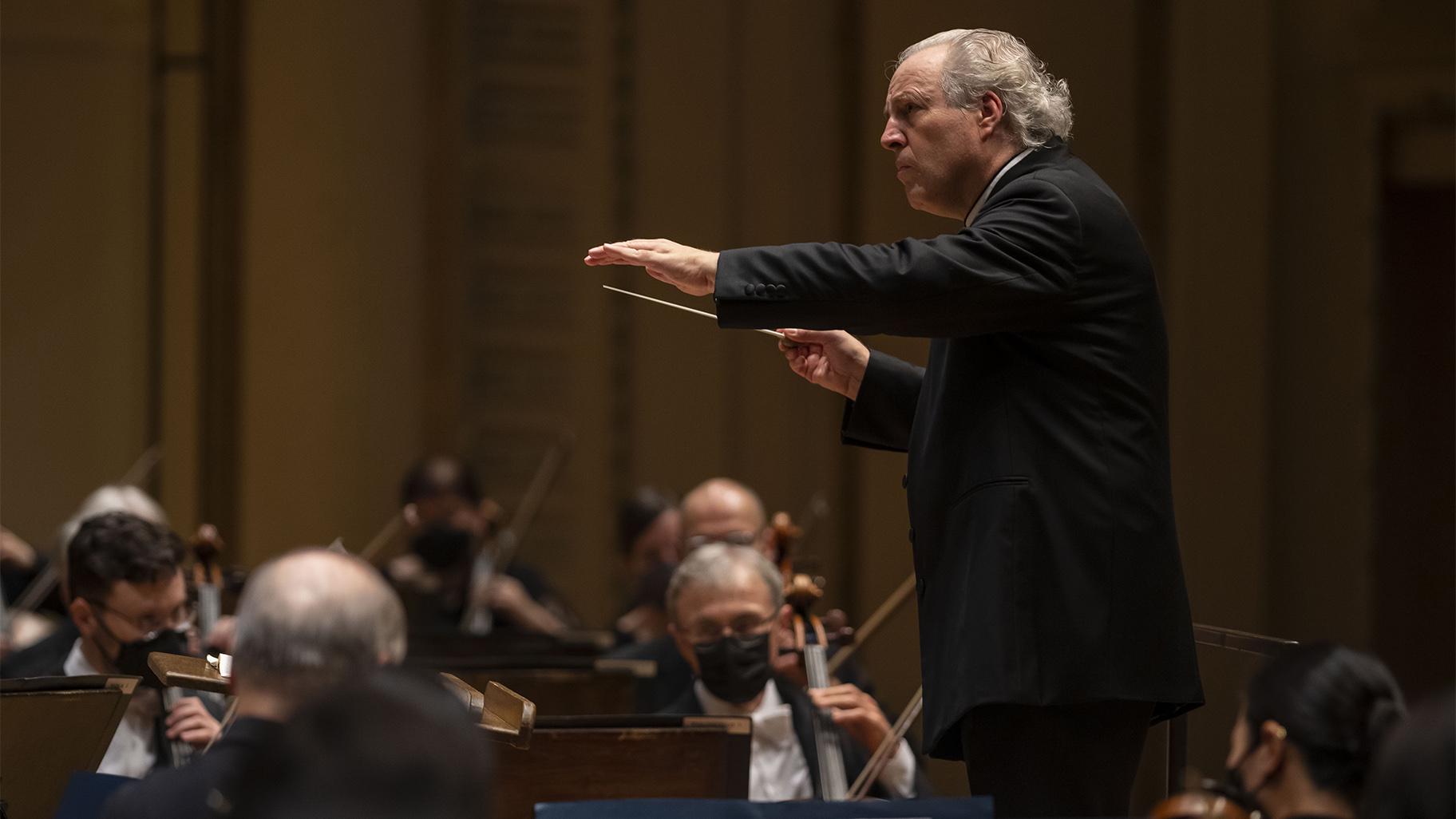Guest conductors Manfred Honeck and Denis Matsuev thank the audience for their performance of Prokofiev Piano Concerto No. 3 with the Chicago Symphony Orchestra. (Photo of Todd Rosenberg)
Call it a particularly inspired combination of centuries-old musical geniuses.
The Chicago Symphony Orchestra’s program on Thursday night began with the fascinating 2017 work “Coincident Dances” by the orchestra’s current Mead composer Jessie Montgomery. She is never fascinated by the rhythmically complex, richly organized and highly original work.
After that, Prokofiev’s knockout “Piano Concerto No. 3 in C major” appeared in 1921. This is a large test of the dangle pianist at its heart, along with formidable challenges in all sections of the orchestra. Russian pianist Denis Matsuev performed very enthusiastically and seemingly easy.
After listening to both this concert and the stunning performance of Prokofiev’s “Piano Concerto No. 1 in D Flat Major” by Ukrainian-born pianist Alexander Gavrylyuk, I said I witnessed the “Prokofiev Piano Concerto Olympics”. I was happy to say that. It happened that the composer himself was a piano soloist for both of these terrifying concertos when he visited Chicago in 1918 and 1921.
First, Montgomery’s work is a clever use of an orchestra that includes a variety of percussion instruments, from various drums to shakers, suspended cymbals, woodblocks and tambourines, despite a run time of only 12 minutes. Gives a formidable impression. Cowbell, xylophone, etc. And, of course, for a native New Yorker, she harnesses the energy of a rich urban melting pot.
“Coincident Dances” begins with a short solo on a mellow bass and quickly transitions to an enthusiastic riff of plucked string instruments, wind and horns. These rhythmic shifts are as appealing but seamless as the clever mix of melodic and dissonant. At one moment there is a hint of Aaron Copland, and throughout this work there is energy and excitement that is not forced but always present. This is best described as a complex and clever crazy sounding quilt that never ceases to be surprised and delighted. As always, Montgomery’s work hoped that the choreographer would get this work and her other orchestra scores, which according to the program notes, will be performed nearly 400 times this year. ..
Montgomery was in the audience, taking multiple bows and going on stage to throw a thank-you kiss to the musician and Vienna-born Manfred Honeck. Honeck is an impeccable, especially graceful guest conductor, now the music director of the Pittsburgh Symphony Orchestra, and has long ties to many European orchestras and opera houses.
 Jessie Montgomery of Mead Composer in Residence acknowledges the audience following a “coincidence dance” performance with the Chicago Symphony Orchestra on October 28, 2021. (Photo by Todd Rosenberg)
Jessie Montgomery of Mead Composer in Residence acknowledges the audience following a “coincidence dance” performance with the Chicago Symphony Orchestra on October 28, 2021. (Photo by Todd Rosenberg)
Now let’s move on to Prokofiev and Matsuev.
Opened to the lyrical sound of the wind and the hum of the strings, the piano enters with an explosion of energy and a familiar melody. A formidable figure with big hands, Matsuev brings obvious power to these ultra-fast passages. The movement of his rapid-firing fingers is as elastic as movement, ideally clearly represented. He has a way to take advantage of the stormy power and depth of the score, and the dreamy lyrical moments. And when the time of fireworks and anger comes, he can easily generate them, with a variety of clarinets and flute linings, perfect string sections, timpani, bass drums, castanets, tambourines, cymbals. With percussion, every part of the mix captures Prokofiev’s crazy and unprecedented drama genius.
Despite the demonic demands of this piece, Matsuev’s performance had a great deal of buoyancy — a clear sense of joy. And the level of excitement produced by all the musicians associated with the pure technical brilliance of the work stimulated that rare, but sometimes uncontrollable reaction of the audience to applaud between movements.
The continuous listening to Prokofiev and Montgomery’s work also reminded me of the subtle and thoughtful mixing and matching of CSO programs. It’s good that these two works are paired, at least in part, so that you can detect subtle correspondences and differences.
The concert ended with a beautifully realized performance by another era genius Franz Schubert. His “Symphony No. 8 in B minor (unfinished)”, written in 1822, lacks the usual third movement. Probably not written because of his serious health deterioration, he died at the age of 31. The funeral begins with a beautiful declaration of life and creates unmistakable delight in the pure charm of familiar melodies. And Honeck won the entire emotional range of both Schubert’s score and the notable musicians who gathered in front of him.
 Guest conductor Manfred Honeck leads the Chicago Symphony Orchestra on October 28, 2021 in Schubert’s Symphony No. 8. (Photo by Todd Rosenberg)
Guest conductor Manfred Honeck leads the Chicago Symphony Orchestra on October 28, 2021 in Schubert’s Symphony No. 8. (Photo by Todd Rosenberg)
This concert will be repeated on Saturday at 8 pm. October 30th. For tickets CSO.org Alternatively, call (312) 294-3000.
Details of this story:
In addition to the details of Jessie Montgomery’s work, the work of three other contemporary composers, Ted Hearne, Elijah Daniel Smith and Nathalie Joachim, will be part of “Homecoming” curated by the CSO Music Now Concert this Monday. You can listen to it at the Symphony Center at 7 pm. By Montgomery.
Matsuev New name, A charity that “identifies and nurtures musically talented children and promotes music education throughout Russia.” For the past five years, I have followed his guidance in Elisey Mysin. Mycin was a true piano genius, and from the age of six he enjoyed many performances, including Rachmaninoff’s duet with Matsuev. Mysin videos can be found on YouTube.. And someday I want to meet him on the stage of the orchestra hall.
Follow Hedy Weiss on Twitter: @HedyWeissCritic
CSO soars with the wings of two illustrious century-spinning modernists | Chicago News
Source link CSO soars with the wings of two illustrious century-spinning modernists | Chicago News
The post CSO soars with the wings of two illustrious century-spinning modernists | Chicago News appeared first on Illinois News Today.


No comments:
Post a Comment